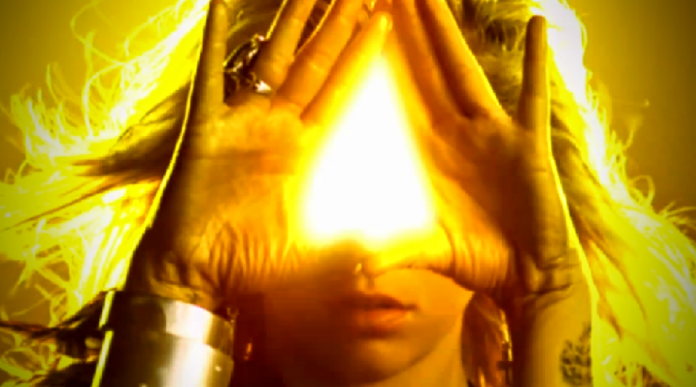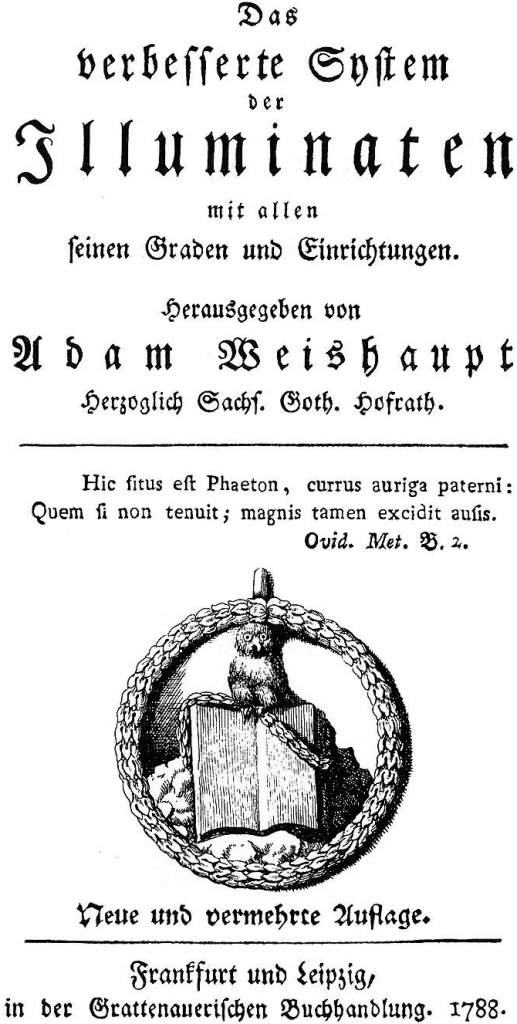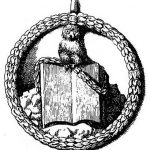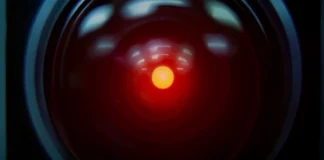TBU NEWS is going to be objective as much as possible and will try to publish information’s coming from different sources, perspectives and opinions. I hope that we will be able to give you some extra “brain food” for you to contemplate. You be the Judge!
Let’s start…


Some people think that these kind of beliefs are just pure conspiracy theories and some think it’s the truth. Despite two opposites, The Truth is usually somewhere in the middle. But…
But What if this is not what it seems. WHAT IF?
Yes they all exist or existed but are they involved in some direct and deliberate conspiracy to hurt us all or they are just trying to earn more money, preserve their wealth, position, influence, their opinion, their perception what is best for everyone, what is right or wrong etc. (we all behave in this meaner from time to time) .
They are setting trends and their responsibility is far greater but we do follow them, Yes we do! (Most of us does) We have allowed them to be in charge so our responsibility is pretty clear. We have gave them the permission (mostly) to act this way, Yes we did! Think about that. We all have free will as they do. Sometimes will of another is imposed on us but that’s another perspective, Let’s stick to this one.
They are merging companies, influences, political and military power, but they do it because they want to survive as we all do. Survival is humanity primary instinct. Sometimes that instinct delivers us some bad news, but nevertheless it’s in our human nature to act as predators and to fear.
Nobody wants to lose its own money. No politician wants to lose his/her power. In some countries there are laws that prevent politicians to keep power longer than they should but often those laws are not implemented or circumvented.
Business Environment is no exception. No businessman want’s to lose its money because they are soft or emotional. They will fight to keep their prestige and power. Often the measures taken to achieve that prestige are destructive and detached from sense of humanity. But it happens. If these thing do happen, then people involved in such misconduct should be made accountable and processed in criminal court of law.
We are responsible too. We all are. Are we not?
Nobody can ride your back unless you are not bent. If you blame somebody else and do not accept responsibility then you are just transferring power over your life to somebody else and you do it for free. Take responsibility and deal with it.
This is not a book only a post and quite superficial one. We don’t have a lot of time and if you want you can research this topic but first you must start from yourself it is the easiest way. It’s a good advice.
Free will what an awesome thing!
Now Let’s get back at the topic. What if this is not what it seems. WHAT IF?
Let me give you some historical facts about one of those groups that i have already mentioned earlier in this article.
Illuminati
Historically, the name refers to the Bavarian Illuminati, an Enlightenment-era secret society founded on May 1, 1776. The society’s goals were to oppose superstition, obscurantism, religious influence over public life and abuses of state power. “The order of the day,” they wrote in their general statutes, “is to put an end to the machinations of the purveyors of injustice, to control them without dominating them.” The Illuminati—along with Freemasonry and other secret societies—were outlawed through Edict, by the Bavarian ruler, Charles Theodore, with the encouragement of the Roman Catholic Church, in 1784, 1785, 1787 and 1790. In the several years following, the group was vilified by conservative and religious critics who claimed that they continued underground and were responsible for the French Revolution.


In subsequent use, “Illuminati” refers to various organizations which claim or are purported to have links to the original Bavarian Illuminati or similar secret societies, though these links are unsubstantiated. They are often alleged to conspire to control world affairs, by masterminding events and planting agents in government and corporations, in order to gain political power and influence and to establish a New World Order. Central to some of the most widely known and elaborate conspiracy theories, the Illuminati have been depicted as lurking in the shadows and pulling the strings and levers of power in dozens of novels, movies, television shows, comics, video games and music videos.
These are some blunt facts taken out from Wikipedia. But let’s see some facts in details about Enlightenment-era and Illuminati contribution or not? What have we / they done?
Enlightenment ERA
Enlightenment, French siècle des Lumières (“Age of the Enlightened”), German Aufklärung, a European intellectual movement of the 17th and 18th centuries in which ideas concerning God, reason, nature, and man were synthesized into a worldview that gained wide assent and that instigated revolutionary developments in art, philosophy, and politics. Central to Enlightenment thought were the use and the celebration of reason, the power by which man understands the universe and improves his own condition. The goals of rational man were considered to be knowledge, freedom, and happiness.
The powers and uses of reason had first been explored by the philosophers of ancient Greece, who discerned in the ordered regularity of nature the workings of an intelligent mind. Rome adopted and preserved much of Greek culture, notably including the ideas of a rational natural order and natural law. Amid the turmoil of empire, however, a new concern arose for personal salvation, and the way was paved for the triumph of the Christian religion. Christian thinkers gradually found uses for their Greco-Roman heritage. The system of thought known as Scholasticism, culminating in the work of Thomas Aquinas, resurrected reason as a tool of understanding but subordinated it to spiritual revelation and the revealed truths of Christianity.
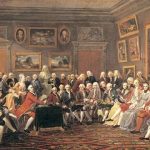

The successful application of reason to any question depended on its correct application—on the development of a methodology of reasoning that would serve as its own guarantee of validity. Such a methodology was most spectacularly achieved in the sciences and mathematics, where the logics of induction and deduction made possible the creation of a sweeping new cosmology. The success of Newton, in particular, in capturing in a few mathematical equations the laws that govern the motions of the planets gave great impetus to a growing faith in man’s capacity to attain knowledge. At the same time, the idea of the universe as a mechanism governed by a few simple (and discoverable) laws had a subversive effect on the concepts of a personal God and individual salvation that were central to Christianity.
Inevitably, the method of reason was applied to religion itself. The product of a search for a natural—rational—religion was Deism, which, although never an organized cult or movement, conflicted with Christianity for two centuries, especially in England and France. For the Deist a very few religious truths sufficed, and they were truths felt to be manifest to all rational beings: the existence of one God, often conceived of as architect or mechanician, the existence of a system of rewards and punishments administered by that God, and the obligation of men to virtue and piety. Beyond the natural religion of the Deists lay the more radical products of the application of reason to religion: skepticism, atheism, and materialism.
The Enlightenment produced the first modern secularized theories of psychologyand ethics. John Locke conceived of the human mind as being at birth a tabula rasa, a blank slate on which experience wrote freely and boldly, creating the individual character according to the individual experience of the world. Supposed innate qualities, such as goodness or original sin, had no reality. In a darker vein, Thomas Hobbes portrayed man as moved solely by considerations of his own pleasure and pain. The notion of man as neither good nor bad but interested principally in survival and the maximization of his own pleasure led to radical political theories. Where the state had once been viewed as an earthly approximation of an eternal order, with the City of Man modeled on the City of God, now it came to be seen as a mutually beneficial arrangement among men aimed at protecting the natural rights and self-interest of each.
The idea of society as a social contract, however, contrasted sharply with the realities of actual societies. Thus the Enlightenment became critical, reforming, and eventually revolutionary. Locke and Jeremy Bentham in England, Jean-Jacques Rousseau, Montesquieu, and Voltaire in France, and Thomas Jefferson in America all contributed to an evolving critique of the arbitrary, authoritarian state and to sketching the outline of a higher form of social organization, based on natural rights and functioning as a political democracy. Such powerful ideas found expression as reform in England and as revolution in France and America.
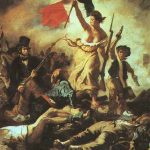

So, Not bad at all ? Or it was? They were quite revolutionary at that time, Wouldn’t you agree?
Whatever you think about Illuminati the Enlightenment era was good thing to happen to humanity. The need of times. We would never say that Galileo Galilei was wrong or Giordano Bruno. Bruno was burnt because of The Truth and he was one of the Illuminati (if you understand what that word stands for and means) Was he not?
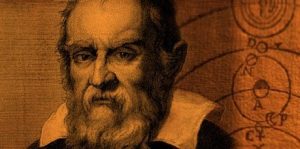

Galileo Galilei was an Italian astronomer, physicist and engineer, sometimes described as a polymath. Galileo has been called the “father of observational astronomy”, the “father of modern physics”, the “father of the scientific method”, and the “father of modern science”.


Giordano Bruno born Filippo Bruno, 1548 – 17 February 1600) was an Italian Dominican friar, philosopher, mathematician, poet, and cosmological theorist. He is known for his cosmological theories, which conceptually extended the then-novel Copernican model. He proposed that the stars were distant suns surrounded by their own planets, and he raised the possibility that these planets might foster life of their own, a philosophical position known as cosmic pluralism. He also insisted that the universe is infinite and could have no “center”.
Starting in 1593, Bruno was tried for heresy by the Roman Inquisition on charges of denial of several core Catholic doctrines, including eternal damnation, the Trinity, the divinity of Christ, the virginity of Mary, and transubstantiation. Bruno’s pantheism was also a matter of grave concern, as was his teaching of the transmigration of the soul. The Inquisition found him guilty, and he was burned at the stake in Rome’s Campo de’ Fiori in 1600. After his death, he gained considerable fame, being particularly celebrated by 19th- and early 20th-century commentators who regarded him as a martyr for science, although historians have debated the extent to which his heresy trial was a response to his astronomical views or to other aspects of his philosophy and theology. Bruno’s case is still considered a landmark in the history of free thought and the emerging sciences.
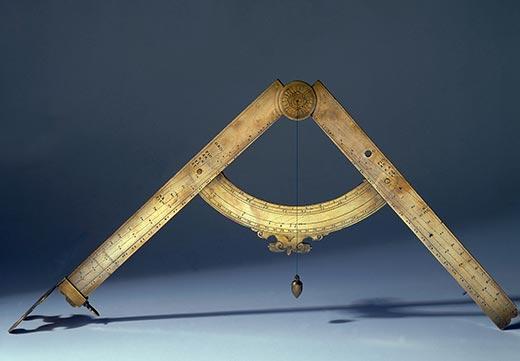

So, What have Enlightenment meant for Galileo and Giordano Bruno? We can only guess. Let’s guess.
Was it the truth and knowledge?
There has always been use of knowledge for right and misuse of that same knowledge for wrong. But it’s not always black and white situation. Sometimes things seem to be bad and later they do develop into a positive outcome. Often things do go in a wrong direction with a negative result. Yes, there is “darkness” and there is “The Light” but there is also a “Grey Area” that has a potential to become one of those two. It all depends on our Free Will and the state of perception from a beholder of that same knowledge. Nevertheless this does not diminish our responsibility in any way.
Every idea has its own evolution, progress and deeds that follows that idea. Ideas are usually built on good intentions. But actions that follow that idea are those that matter. It’s not an idea as idea that matters so much, human action does. Humans give the idea it’s wings to Rise or to Fall. It’s Human Nature, but not Human Nature as excuse but as a fact. These same things that were mentioned and cosmic principals are the same laws that are governing us all and “them”. Let’s repeat, We all have a choice, free will and responsibility in a cosmic and universal way. We don’t need to accept it. It is a part of it and it doesn’t matter if we accept it or not, it goes along.
We can freely say that we all sometimes shine like Illuminati but are we the Illuminated ones? Or not? Maybe we are but we just forgotten it. ( This is another perspective, nevertheless, next time, maybe)
It seems that this was not a short article after all. We will continue and I hope we will evolve further trough this perspective or as we often say point of view.
Sit Lux et Lux Fuit – Carpe Lucem
Written and updated by Founder of TBU NEWS Zeljko Mihajlovic
Sources used for this article:
Wikipedia , Encyclopedia Britannica and many others.
* (The article has been updated on 27.01.2019, It was originally published couple of years ago) *
Best Regards
TBU NEWS

